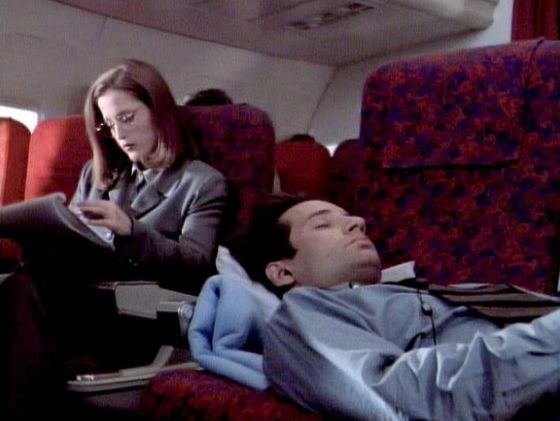
After reading adornofangirl's post this morning detailing her sister's objections to TSA screening procedures, I did a little more research online and decided to opt-out. Besides the health risks which initially motivated this decision, reading the official TSA blog post on this issue cemented the decision.
The post used obviously misrepresented data, illogical arguments, and straight-up bullying (e.g. calling reports of negative experiences with screening procedures "unfounded" and "outlandish claims") to persuade readers to cooperate. The commenters all saw through it, of course, and are worth reading (especially because they contain helpful links). My favorite comment was from "Chris Bray":
Blogger Bob, you have a bureaucrat's gift for changing the substance of a criticism as you pretend to respond to it. You seem to be unable to notice what you're saying as you say it. Compare the format:
1.) Is the new pat-down invasive? No, it's only for people who set off a metal detector alarm or refuse AIT. (yours)
2.) Are you going to punch me in the face? No, blueberry pancakes. (my example)
Only you don't notice that your non sequiturs are non sequiturs.
Lol. Anyway, I wanted to contribute what I could to the work these commenters were doing in sharing what they know in order to help people make informed decisions about their privacy, bodies, safety, etc. So I'm recording what the experience of opting-out today was like.
While I was standing in line, I asked a nearby TSA official what I would have to do if I was going to opt out (she explained politely--everyone was very polite). Another official overheard me and asked (kindly, though a little condescendingly) what I was afraid of. I gave the best explanation I could of what I'd read that morning, which she and the people around me in line laughed off: "If it was dangerous, they wouldn't let us operate the machines!" etc. I said, "Well, maybe I'm paranoid" (more about that later).
When I got to the scanners, I was directed towards a big blue hallway-looking thing, which I thought might just be a partition I had to walk through to get to the patdown area (it was between two of the old-style scanners that I'm used to). As soon as I approached it, though, I realized it was buzzing loudly and smelled funny (like a lightning storm sort of?). I backed out and asked if it was "the scanner thing" (it was). About three officials sort of pounced over to me and said "not to run away" and directed me to a waiting area.
While I was waiting, I accidentally leaned against (something?) and alarms started going off, which made me feel even more vaguely guilty/nervous than I was already feeling. I also noticed that the pat-downs would take a lot of time and personnel--even at a small airport like this, they wouldn't be able to handle the volume if everyone opted out. In other words, the majority of people have to opt for the scanners in order for the system to work.
The woman who did the pat-down had what I'd describe as a great "bedside manner"--she explained everything she was doing, was friendly, etc. But it is extremely invasive. They touch everything. And pull out the waistband of your pants and look down them. Apparently there's no way to get through airport security without someone seeing your underwear.
Afterwards, when I was getting my things together, I had this sudden rush of emotion like I was about to cry. Even though the whole process went probably as smoothly as possible, and I felt rationally good about it, my body still responded to it as a stressful and upsetting experience.
Anyway, shifting to the subject of paranoia: I watched a lot of X-Files growing up and I'm sure that's shaped how I relate to the world. One of the main things I liked about it was that Mulder and Scully never just accepted what they were told but always delved deeper to come up with more accurate (and, importantly, more interesting) explanations. They were always trying to organize their knowledge and experiences in order to develop complex theories of the truths (out there). Here's their (self-reflexive) analysis of paranoia:
Mulder: "There's something inherently American about paranoia. Given the increasing scarcity of rational things to fear in 20th century American society, we dream up theories whose inevitable result is the chaotic disruption of our comfortable, orderly life--usually with dastardly consequences. I think we get a perverse thrill that comes from it."
Scully: "Mulder, are you suggesting that we somehow create our own quirky focal points of paranoia, as a result of the lack of things that are worth fearing in our day-to-day lives? That we're not whole as beings without something to worry about, something to keep our eye on?"
Does my opting out really have nothing to do with anything rational (being scientifically informed) or politically motivated (advocating for the right to privacy) but actually just my attempt to construct a rational sphere of existence in which I can make informed decisions and assert some semblance of agency? Uncomfortable with the feeling that I don't know anything and no amount of research can lead me to a stable truth with which to guide my decision making, I randomly and subconsciously select a "quirky focal point" that I decide to have a definite opinion on? Some people choose local-vore diets, college basketball, religion, or rocking the vote; I choose airport security--and though we all have our reasonings, maybe at the core we're really just picking our personal brand of paranoia.
